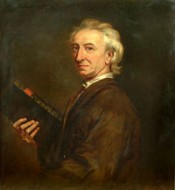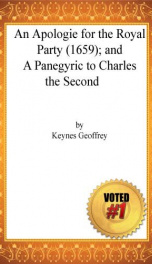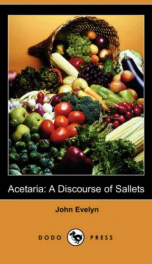Evelyn John

John Evelyn (31 October 1620 – 27 February 1706) was an English writer, gardener and diarist. Evelyn's diaries or Memoirs are largely contemporaneous with those of the other noted diarist of the time, Samuel Pepys, and cast considerable light on the art, culture and politics of the time (he witnessed the deaths of Charles I and Oliver Cromwell, the last Great Plague of London, and the Great Fire of London in 1666). Over the years, Evelyn’s Diary has been over-shadowed by Pepys's chronicles of 17th-century life.[1] Evelyn and Pepys corresponded frequently and much of this correspondence has been preserved. Born into a family whose wealth was largely founded on gunpowder production, John Evelyn was born in Wotton, Surrey, and grew up in the Sussex town of Lewes. He was educated at Balliol College, Oxford and at the Middle Temple. While in London, he witnessed important events such as the execution of Thomas Wentworth, Earl of Strafford. Having briefly joined the Royalist army, he went abroad to avoid further involvement in the English Civil War. He travelled in Italy, attending anatomy lectures in Padua in 1646 and sending the Evelyn Tables back to London. In 1644, Evelyn visited the Venerable English College at Rome, where Catholic priests were trained for service in England. He married Mary Browne, daughter of Sir Richard Browne the British ambassador in Paris in 1647.[2] In 1652, Evelyn and his wife settled in Deptford (now in south-east London). Their house, Sayes Court (adjacent to the naval dockyard), was purchased by Evelyn from his father-in-law Sir Richard Browne in 1653 and Evelyn soon began to transform the gardens. In 1671, he encountered master wood-worker Grinling Gibbons (who was renting a cottage on the Sayes Court estate) and introduced him to Sir Christopher Wren. There is now an electoral ward called Evelyn in the Deptford area of the London Borough of Lewisham. It was after the Restoration that Evelyn's career really took off. In 1660, Evelyn was a member of the group that founded the Royal Society. The following year, he wrote the Fumifugium (or The Inconveniencie of the Aer and Smoak of London Dissipated), the first book written on the growing air pollution problem in London. He was known for his knowledge of trees, and his treatise Sylva, or A Discourse of Forest Trees (1664) was written as an encouragement to landowners to plant trees to provide timber for England's burgeoning navy. Further editions appeared in his lifetime (1670 and 1679), with the fourth edition (1706) appearing just after his death and featuring the engraving of Evelyn shown on this page even though it had been made more than 50 years prior by Robert Nanteuil in 1651 in Paris. Various other editions appeared in the 18th and 19th centuries and feature an inaccurate portrait of Evelyn made by Francesco Bartolozzi. During the Second Anglo-Dutch War, beginning 28 October 1664, Evelyn served as one of four Commissioners for taking Care of Sick and Wounded Seamen and for the Care and Treatment of Prisoners of War. (The others were Sir William D'Oyly, Sir Thomas Clifford and Col. Bullen Reymes.) Following the Great Fire in 1666, closely described in his diaries, Evelyn presented one of several plans (Christopher Wren produced another) for the rebuilding of London, all of which were roundly ignored by Charles II. He took an interest in the rebuilding of St Paul's Cathedral by Wren (with Gibbons' artistry a notable addition). Evelyn's interest in gardens even led him to design pleasure gardens, such as those at Euston Hall. Evelyn was a prolific author and produced books on subjects as diverse as theology, numismatics, politics, horticulture, architecture and vegetarianism, and he cultivated links with contemporaries across the spectrum of Stuart political and cultural life. Like Pepys, Evelyn was a lifelong bibliophile, and by his death his library is known to have comprised 3,859 books and 822 pamphlets. Many were uniformly bound in a French taste and bear his motto Omnia explorate; meliora retinete ("explore everything; keep the best") from I Thessalonians 5, 21. His daughter Maria Evelyn (1665–1685) is sometimes acknowledged as the pseudonymous author of the book Mundus Muliebris of 1690. Mundus Muliebris: or, The Ladies Dressing Room Unlock'd and Her Toilette Spread. In Burlesque. Together with the Fop-Dictionary, Compiled for the Use of the Fair Sex is a satirical guide in verse to Francophile fashion and terminology, and its authorship is often jointly credited to John Evelyn, who seems to have edited the work for press after his daughter's death. In 1694 Evelyn moved back to Wotton, Surrey because his elder brother George had no living sons available to inherit the estate. Evelyn's own son John ii (1655-99) and grandson John iii (1682–1763) later Sir John Evelyn, bart, were the only hope for Wotton staying in the family. Sayes Court was made available for rent. Its most notable tenant was Russian tsar Peter the Great who lived there for three months in 1698 (and did great damage to both house and grounds). The house no longer exists, but a public park of the same name can be found off Evelyn Street. John and Mary Evelyn had eight children: Richard (1652–8), John Standsfield (1653–4), John (1655–99), George (1657–8), Richard ii (1664), Mary (1665–85), Elizabeth (1667–85) and Susanna (1669–1754). Only Susanna outlived her parents. Evelyn died in 1706 at his house in Dover Street, London. His wife Mary died three years later. Both are buried in the Evelyn Chapel in St John's Church at Wotton. In 1992 their skulls were stolen by persons unknown who hacked into the stone sarcophagi on the chapel floor and tore open the coffins. They have not been recovered. Evelyn's epitaph (original spelling) reads: Here lies the Body of JOHN EVELYN Esq of this place, second son of RICHARD EVELYN Esq who having served the Publick in several employments of which that Commissioner of the Privy Seal in the reign of King James the 2nd was most Honourable: and perpetuated his fame by far more lasting Monuments than those of Stone, or Brass: his Learned and useful works, fell asleep the 27th day of February 1705/6 being the 86th Year of his age in full hope of a glorious resurrection thro faith in Jesus Christ. Living in an age of extraordinary events, and revolutions he learnt (as himself asserted) this truth which pursuant to his intention is here declared. That all is vanity which is not honest and that there's no solid Wisdom but in real piety. Of five Sons and three Daughters borne to him from his most vertuous and excellent Wife MARY sole daughter, and heiress of Sir RICHARD BROWNE of Sayes Court near Deptford in Kent onely one Daughter SUSANNA married to WILLIAM DRAPER Esq of Adscomb in this County survived him the two others dying in the flower of their age, and all the sons very young except one nam'd John who deceased 24 March 1698/9 in the 45th year of his age, leaving one son JOHN and one daughter ELIZABETH. Wotton passed down to Evelyn's great-great-grandson Sir Frederick Evelyn (1733–1812). The baronetcy next passed to Frederick Evelyn's cousins, Sir John Evelyn, 4th Bt (1757–1833) and Sir Hugh Evelyn, 5th Bt (1769–1848). Both these two were of unsound mind and the estate was therefore left to a remote cousin descended from the diarist's grandfather's first marriage, in whose family it remains to this day though they no longer occupy the house. The title died out in 1848. However, there are many living descendants of John Evelyn the diarist via his daughter Susanna, Mrs William Draper, and his granddaughter Elizabeth, Mrs Simon Harcourt. In 1977 and 1978 in eight auctions at Christie's, a major surviving portion of Evelyn's library was sold and dispersed.[3] The British Library holds a large archive of Evelyn's personal papers including the manuscript of his Diary.[4] The Victoria and Albert Museum has in its collection a cabinet owned by Evelyn which is thought to have housed his diaries. In 2005 a new biography by Gillian Darley, based on full access to the archive, was published.[5]
do you like this author?
What readers are saying
What do you think? Write your own comment on this book!
write a commentWhat readers are saying
What do you think? Write your own comment on this author!
write a commentBook list

The History of Sabatai SeviThe Suppos'd Messiah of the Jews
Series:
Unknown
Year:
Unknown
Raiting:
3.5/5
Show more
add to favoritesadd In favorites

Sylva,Vol. 1 (of 2)
Or A Discourse of Forest Trees
Series:
Unknown
Year:
Unknown
Raiting:
4.5/5
Show more
add to favoritesadd In favorites
Book list

The History of Sabatai SeviThe Suppos'd Messiah of the Jews
Series:
Unknown
Year:
Unknown
Raiting:
3.5/5
Show more
add to favoritesadd In favorites

Sylva,Vol. 1 (of 2)
Or A Discourse of Forest Trees
Series:
Unknown
Year:
Unknown
Raiting:
4.5/5
Show more
add to favoritesadd In favorites

Sylva, Vol. 1 (of 2)
Series:
Unknown
Year:
Unknown
Raiting:
5/5
From Content: "Among the prose writers of the second half of the seventeenth century John Evelyn holds a very distinguished position. The age of the Restoration and the Revolution is indeed rich in many names that have won for themselves an enduring place in the history of English literature. South, Tillotson, and Barrow among theologians, Newton in mathematical science, Locke and Bentley in philosophy and classical learning, Clarendon and Burnet in history, L-Estrange, Butler, Marvell and Dryden in miscellaneous prose, and Temple as an essayist, have all made their mark by prose writings which will endure for all time. But the names which stand out most prominently in popular estimation as authors of great masterpieces in the prose of this period are certainly those of John Bunyan, John Evelyn, and Izaak Walton. And along with them Samuel Pepys is also well entitled to be ranked as a great contemporary writer, though he was at pains to try and ensure his being permitted to remain free from the publicity of authorship, for such time at least as the curious might allow his Diary to remain hidden in the cipher he employed. With the great though untrained genius of Bunyan none of these other three celebrated prose authors of this time has anything in common. He stands apart from them in his fervently religious and romantic temperament, in his richness of - representation and ingenuity of analogy, and in his forcible quaintness of style, as completely as he did in social status and in personal surroundings. In complete contrast to the romantic productions of the self-educated tinker of Bedford, the works of Walton and Evelyn were at any rate influenced by, though they can hardly be said to have been moulded upon, the style of the preceding age of old English prose writers ending with Milton. The influence of the latter is, indeed, plainly noticeable both in the diction and in the general sentiment of these two great masters of the pure, nervous English of their period. It would serve no good purpose to make any attempt here to trace the points of resemblance between the works of Walton and Evelyn, and then to note their differences in style. Each has contributed a masterpiece towards our national literature, and it would be a mere waste of time to make comparisons between their chief productions. This much, however, may be remarked, that the conditions under which each worked were completely different from those surrounding the other. Izaak Walton, the author of many singularly interesting biographies, and of the quaint half-poetical Compleat Angler or the Contemplative Man-s Recreation, the great classic -Discourse of Fish and Fishing,- was a London tradesman, while his equally celebrated contemporary John Evelyn, author of Sylva, or a Discourse of Forest Trees, the classic of British Forestry, was a more highly cultured man, who wrote, in the leisure of official duties and amid the surroundings of easy refinement, many useful and tasteful works both in prose and poetry, ranging over a wide variety of subjects. Judging from the number of editions which appeared of their principal works, they were both held in great favour by the reading public, though on the whole the advantage in some respects lay with Evelyn. But during the present century the taste of the public, judged by this same rough and ready, practical standard, has undoubtedly awarded the prize of popularity to Izaac Walton."
Show more
add to favoritesadd In favorites

An Apologie for the Royal Party (1659); and A Panegyric to Charles the Second (1661)
Series:
Unknown
Year:
Unknown
Raiting:
4.5/5
"Excerpt from the book..."On October 24, 1659, a quarto pamphlet was published in London with thefollowing title: "The Army's Plea for Their present Practice: tendered tothe consideration of all ingenuous and impartial men
Show more
add to favoritesadd In favorites

Acetaria: A Discourse of Sallets
Series:
Unknown
Year:
Unknown
Raiting:
1/5
John Evelyn (1620-1706) was an English writer, gardener and diarist. His diaries are largely contemporaneous with those of the other noted diarist of the time, Samuel Pepys, and cast considerable light on the art, culture and politics of the time (he witnessed the deaths of Charles I and Oliver Cromwell, the last Great Plague of London, and the Great Fire of London in 1666. ). Evelyn and Pepys corresponded frequently and much of this correspondence has been preserved. It was after the Restoration that Evelyn's career really took off. In 1660, he was a member of the group that founded the Royal Society. The following year, he wrote the Fumifugium (or The Inconveniencie of the Aer and Smoak of London Dissipated), the first book written on the growing pollution problem in London. He was known for his knowledge of trees, and his treatise Sylva; or, Discourse on Forest Trees (1664) was written as an encouragement to landowners to plant trees to provide timber for England's burgeoning navy.
Show more
add to favoritesadd In favorites
What readers are saying
What do you think? Write your own comment on this author!
write a commentif you like Evelyn John try:
readers also enjoyed
What readers are saying
What do you think? Write your own comment on this author!
write a commentGenre
if you like Evelyn John try:
readers also enjoyed
Do you want to read a book that interests you? It’s EASY!
Create an account and send a request for reading to other users on the Webpage of the book!

